喵!猫能够读懂你的心情
BBC罗宾·怀利(Robin Wylie)(2023年10月30日)
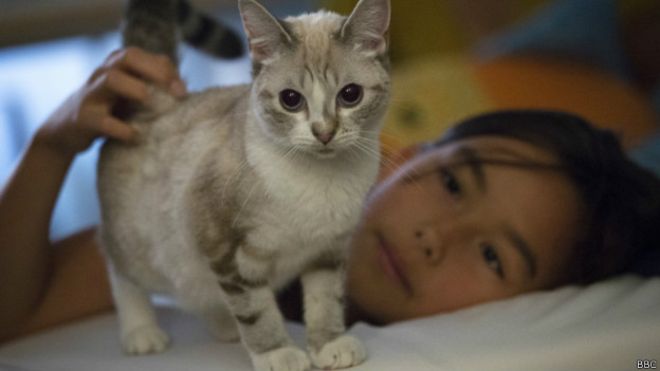
猫知道主人是否快乐
如果你经常上网,你一定至少明白一件事:人类喜欢猫。
但是,猫对人怎么看,我们却不太了解。与忠实的狗相比,猫似乎对人的事情漠不关心。
但是,似乎我们的猫科伙伴比我们以为的要更加关注我们。它们似乎能够看出来我们高兴的时候。
新的研究发现了强有力的第一手证据,证明猫对人类的情绪表征很敏感。
在美国密歇根州罗彻斯特(Rochester)的奥克兰大学(Oakland University),莫里亚·嘉尔凡(Moriah Galvan)和詹妮弗·冯克(Jennifer Vonk)研究了12只猫及其主人。他们发现主人微笑或皱眉时,猫的反应是不一样的。
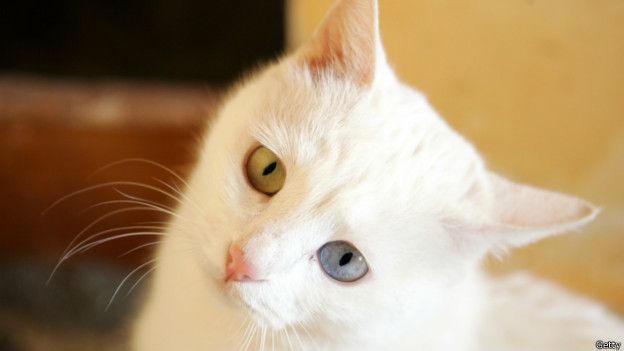
猫可能会注意我们的面部表情
在面对微笑着的主人时,猫作出“积极”行为的可能性大很多,比如发出咕噜咕噜的声音,蹭人,或坐在主人的腿上。与皱眉头的主人相比,猫看起来更喜欢亲近微笑的主人。
该研究成果发表在《动物认知》(Animal Cognition)期刊上。
当研究者把猫的主人替换为陌生人时,这12只猫的反应模式则完全不同,不论陌生人是微笑还是皱眉,猫的积极行为的程度并没有变化。
这个结果说明两件事:一是猫能够读懂人的面部表情,二是猫需要花时间来掌握这一能力。
我们早已知道狗善于辨别人类的面部表情。但是,这是首次发现让人信服的证据,证明猫也有相同的能力。
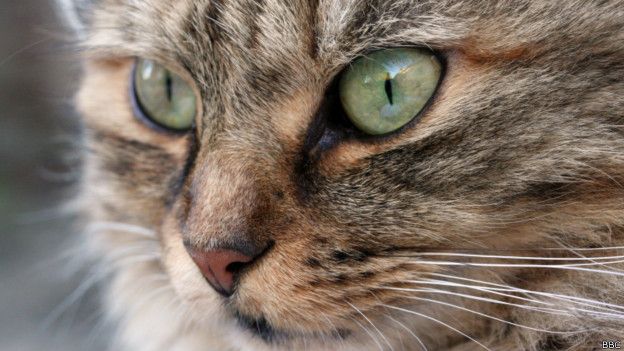
我们认为猫是一种非常以自我为中心的动物
在这之前,人们仅进行过一项关于猫观察人类表情能力的研究。该研究于2023年1月发表,得出了模棱两可的结论。
嘉尔凡和冯克的研究说明猫对人的情绪的敏感程度出乎我们的预料。
但这并不意味着猫能感同身受。更大的可能是猫学会了把主人的微笑与奖赏联系到一起:当人们心情很好时,他们溺爱猫的可能性就更大。
不过,即便猫并不真正理解人的心情,该研究仍然说明猫能够惊人地察觉人的细微表情。
这也说明另一个基本事实:猫对人感兴趣。
“人们关心猫是不是真的理解主人,关注主人,”冯克说,“而我们的研究说明,猫并不是像人们指责的那样冷漠。”
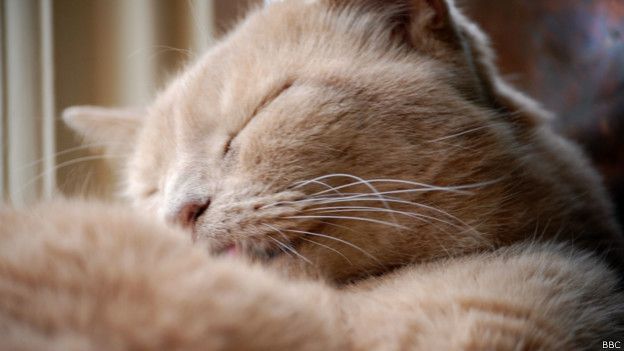
想要紧紧依偎的猫
之所以人们这么晚才发现猫的情商,可能是因为它们的反应太过细微。猫不仅会作出明显的“积极”行为,比如发出咕噜咕噜的声音和蹭人,嘉尔凡和冯克还发现猫有一些身体姿势,比如耳朵和尾巴的动作,与满足有关。
与之相反,科学家几年前就已经知道狗对快乐和愤怒的表情有不同的反应。至少部分原因是狗的反应更加明显。2011年的一项研究表明,狗会主动避免看起来正在生气的人,而不止是改变自己的肢体语言。
狗和猫对人的感情的不同反应可能要追溯到史前时期。
很早以前,人就开始圈养狗。2023年的基因研究表明,这一过程早在3万年前就开始了。相反,家养猫首次出现是在大约1万年前的中东地区。
狗之所以对人的情感有强烈的反应,可能就是因为它们适应人类生活的时间更长。
但是,目前下结论还为时尚早。尽管有很多对狗的大脑的研究,但在关于猫如何对人的表情做出反应,这方面的研究还非常少。
猫可能是最受欢迎的宠物,但是我们对它们还知之甚少:我们甚至不知道它们为什么要发出咕噜咕噜的声音。但是这项研究可能会挽回猫对人漠不关心的口碑。有可能仅仅是它们不像狗那么喜欢表露自己的感情而已。
(责编:友义)
Your cat can pick up on how you are feeling
By By Robin Wylie,30 October 2024
If you have spent much time on the internet, you'll know at least one thing: our species loves cats.
How they feel about us is much less clear. Compared to our devoted dogs, cats seem pretty unconcerned with human affairs.
But it looks like our feline companions pay more attention than we give them credit for. They seem to be able to tell when we are happy.
New research has found the first strong evidence that cats are sensitive to human emotional gestures.
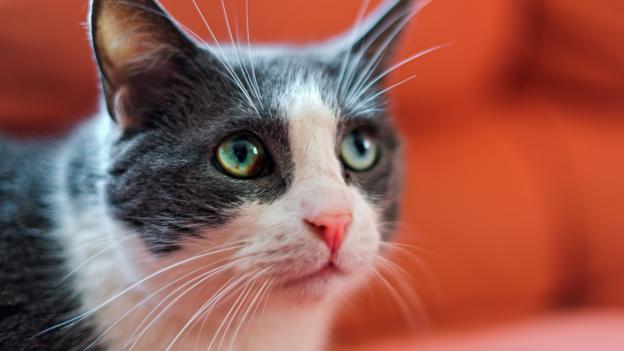
Cats may pay attention to our facial expressions (Credit: Tambako the Jaguar, CC by 2.0)
When faced with a smiling owner, the cats were significantly more likely to perform "positive" behaviours such as purring, rubbing or sitting on their owner's lap. They also seemed to want to spend more time close to their owner when they were smiling than when the owner was frowning.
The findings are published in the journal Animal Cognition.
The pattern was completely different when the 12 cats were presented with strangers, instead of their owners. In this setup, they showed the same amount of positive behaviour, regardless of whether the person was smiling or frowning.
The results suggest two things: cats can read human facial expressions, and they learn this ability over time.

We think of cats as rather self-centred creatures (Credit: Jimmy B, CC by 2.0)
Before this, only one other study has been done on the ability of cats to perceive human emotional expressions. Published in January 2015, it found ambiguous results.
Galvan and Vonk's finding suggests that cats are more in tune with human emotions than we thought.
That does not mean they feel empathy. It's more likely that the cats had learned to associate their owners' smiles with rewards: people are more likely to spoil a cat when they are in a good mood.
Still, even if cats do not truly understand our moods, the study still suggests that they can pick up on surprisingly nuanced human gestures.
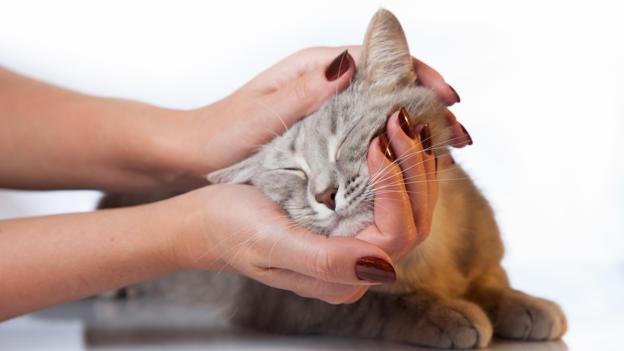
Cats aim to obtain maximum snuggles (Credit: Zoonar GmbH/Alamy Stock Photo)
"People care about whether cats really do understand and pay attention to their owners," says Vonk. "Our work shows that they may not be as indifferent as people accuse them of being."
It may have taken so long to discover cats' emotional intelligence because their responses are rather subtle. As well as obviously "positive" actions like purring or rubbing, Galvan and Vonk noticed that the cats adopted certain body positions, and ear and tail movements, that are associated with contentedness.
In contrast, scientists have known for several years that dogs respond differently to happy and angry faces. That is at least partly because their responses are more obvious. A 2011 study showed that dogs will actively avoid someone who appears angry, rather than just changing their body language.
The difference between dogs' and cats' responses to human emotions could be rooted in prehistory.
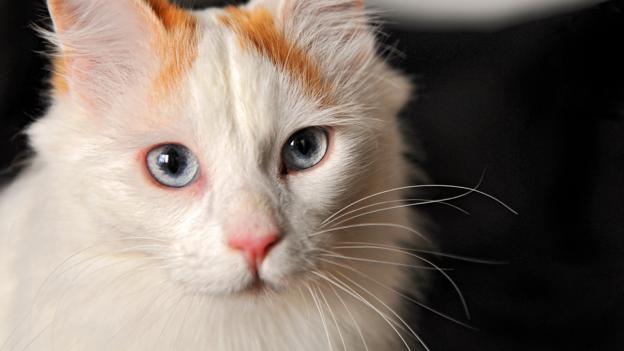
This cat knows your thoughts (Credit: Tambako the Jaguar, CC by 2.0)
Dogs' stronger responses to our emotional gestures could have arisen simply because they have had longer to adapt to life with humans.
But for now it is too early to draw conclusions. While there has been plenty of research into dogs' minds, there have been remarkably few studies of how cats respond to human gestures.
They may be our most popular pet but we still have a lot to learn about them: we do not even know why they purr. But this study might go some way to repairing cats' reputation for being uncaring. It may be that they simply do not show their affection for us as much as dogs do.